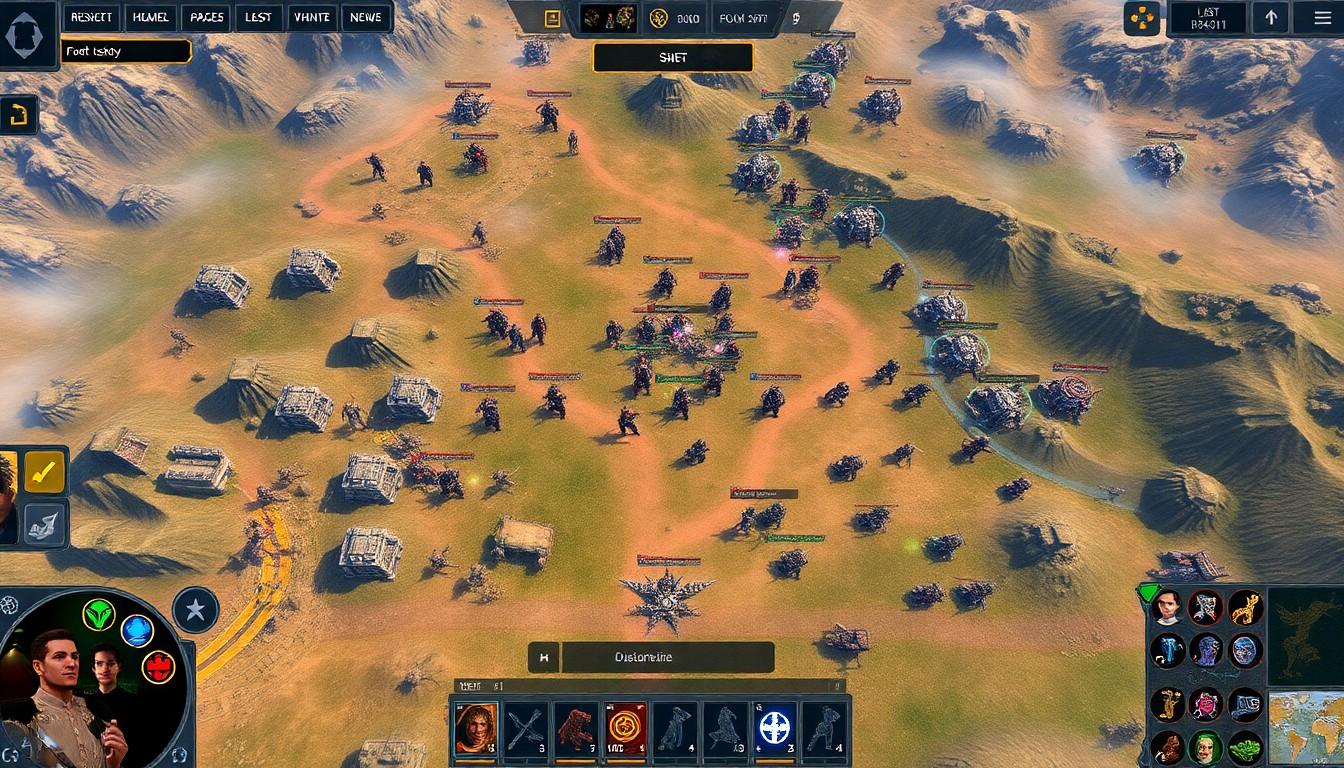In a world where chaos reigns and decisions can lead to glorious victories or epic failures, strategy video games offer a thrilling escape. Players dive into complex realms where every move counts, and the stakes are as high as a dragon’s roar. Whether they’re outsmarting opponents or building empires, gamers embrace the challenge with a mix of cunning and creativity.
Good Strategy Video Games
Good strategy video games captivate players with their depth and complexity. These games challenge players to think critically and make informed decisions. Engaging in tactical gameplay often leads to dynamic and immersive experiences.
Real-time strategy (RTS) games like “StarCraft II” and “Age of Empires IV” require quick thinking and resource management. Players gather resources, build civilizations, and confront opponents. Turn-based strategy (TBS) titles, such as “Civilization VI” and “XCOM 2”, allow for more deliberate planning, where each move can shift the course of the game.
Many strategy games emphasize military tactics and control. Titles like “Warhammer 40,000: Dawn of War” and “Total War: Three Kingdoms” take players into historical or fantastical settings, allowing for large-scale battles and empire-building.
Puzzle and tower defense games also fall under the strategy category. Games like “Plants vs. Zombies” and “The Witness” challenge players to solve intricate problems while defending assets or reaching objectives.
Multiplayer platforms provide a competitive edge. “League of Legends” and “Dota 2” merge strategy with real-time action, requiring teamwork and communication among players.
Overall, varying types of strategy games cater to different preferences, ensuring diverse experiences for players. Each genre offers unique mechanics and narratives that keep gamers engaged. With evolving technology and game design, the landscape of strategy games continues to flourish, enticing both new and seasoned players.
Characteristics of Great Strategy Games

Great strategy games captivate players through their unique features and challenge them to think critically. Elements like engaging mechanics and deep strategic concepts define the genre’s best offerings.
Engaging Gameplay Mechanics
Innovative gameplay mechanics draw players into the action. Real-time mechanics in games such as “StarCraft II” create a sense of urgency, demanding quick decisions. Turn-based options like “Civilization VI” promote thoughtful strategy, allowing players to analyze situations extensively. Variety in gameplay, such as resource management and unit control, enhances enjoyment and satisfaction. Multiplayer modes also boost replayability, encouraging gamers to test their skills against others. Features like terrain advantages and hidden units introduce additional layers of complexity, making each encounter unique.
Deep Strategic Depth
Depth in strategy games challenges the player’s critical thinking. They must weigh short-term gains against long-term consequences, influencing overall gameplay. Various paths to victory exist, ensuring that each game feels fresh. Players engage in resource allocation, unit upgrades, and tactical positioning. Complex AI opponents in titles like “XCOM 2” provide a formidable challenge, pushing players to adapt their strategies. Game environments also offer unique interactions, leading to diverse outcomes based on player choices. Ultimately, the richness of strategic options keeps players engaged across multiple sessions.
Popular Good Strategy Video Games
Good strategy video games capture players’ attention with tactical depth and engaging gameplay mechanics. Here’s a look at popular titles across different strategy subgenres.
Real-Time Strategy (RTS) Titles
“StarCraft II” remains a defining title in real-time strategy gaming. Players engage in fast-paced battles, requiring quick thinking and resource management. Through its competitive multiplayer mode, gamers can refine their skills and strategies against others worldwide. “Age of Empires IV” also highlights historical settings, allowing players to build empires and engage in battles based on real historical events. Each match brings unique challenges through varying civilizations and unit types, making each experience distinct. RTS games emphasize the need for swift decision-making, ensuring that players remain immersed in the intense strategic action.
Turn-Based Strategy (TBS) Titles
“Civilization VI” stands out as a prominent turn-based strategy game. Players explore and develop civilizations, making strategic decisions that affect long-term outcomes. They engage in diplomacy, combat, and cultural expansion, navigating multiple paths to victory. “XCOM 2” offers a tactical combat experience centered on squad management and careful planning. Every move carries weight, as players face challenging AI opponents. Turn-based titles encourage thoughtful strategies, allowing gamers to analyze situations before taking action. This paced gameplay appeals to those who enjoy a more calculated approach to strategy, fostering engagement in every playthrough.
Tips for Choosing the Right Strategy Game
Selecting a strategy game involves understanding personal preferences and the game’s community. Consider specific factors to find the right fit.
Consider Your Play Style
Identifying play style enhances enjoyment of strategy games. Players who prefer fast-paced action may gravitate towards real-time strategy, as seen in “StarCraft II” or “Age of Empires IV.” Those who enjoy methodical planning will appreciate turn-based strategy titles, such as “Civilization VI.” Examining gameplay mechanics helps clarify choices. Players should explore whether they enjoy resource management, tactical combat, or puzzle-solving. Additionally, difficulty levels vary. Gamers looking for a challenge may opt for complex titles like “XCOM 2,” while more casual players might prefer approachable options like “Plants vs. Zombies.”
Assess the Game’s Community and Support
A vibrant community can enhance the gaming experience. Players benefit from engaging with forums, social media groups, and other platforms dedicated to specific games. Checking for active support can indicate the game’s longevity and ongoing development. Communities often share tips, strategies, and content, leading to ongoing enjoyment. Furthermore, many games offer updates and expansions, keeping content fresh and relevant. Evaluating player feedback helps gauge satisfaction levels and potential issues. Access to tutorials and guides may also influence the choice, especially for complex games requiring deeper understanding.
Future Trends in Strategy Gaming
Emerging technologies will reshape strategy gaming experiences. Artificial intelligence is expected to enhance opponent behavior, making challenges more realistic and dynamic. Blockchain technology introduces new gameplay possibilities for ownership and trade between players.
Cloud gaming is revolutionizing accessibility, allowing players to engage with complex games across various devices without requiring high-end hardware. Competitive esports will continue to rise, further professionalizing strategy gaming and attracting wider audiences.
Gamification elements from other genres are likely to blend into strategy games. These elements will create more engaging experiences through narrative-driven campaigns and character progression systems.
Cross-platform play is becoming a key feature, enabling gamers to connect regardless of their chosen device. This inclusivity will deepen communities and expand competitive scenes.
Modding communities are also gaining traction, allowing players to create personalized content and modifications. This player-driven content enriches the gaming landscape, extending the life of popular titles.
Diversity in storytelling will grow, showcasing a wider range of cultures and perspectives within game narratives. This trend will resonate with a broader audience and enhance player immersion.
Finally, strategy games will increasingly focus on cooperative gameplay, fostering teamwork and communication among players. Engaging in these dynamics can offer fresh, collaborative experiences that challenge conventional gameplay structures.
A Unique Blend of Challenge and Creativity
The world of strategy video games offers a unique blend of challenge and creativity that captivates players. With diverse subgenres and innovative mechanics, these games encourage critical thinking and tactical planning. As technology evolves, so do the experiences within this genre, promising even more engaging gameplay and community interactions.
Players can look forward to richer narratives and enhanced multiplayer dynamics that foster collaboration and competition. The future of strategy gaming is bright, and its ability to adapt and innovate ensures that it will continue to attract both new and seasoned gamers alike. Embracing the strategic depth of these games not only enhances enjoyment but also sharpens decision-making skills in an entertaining way.

